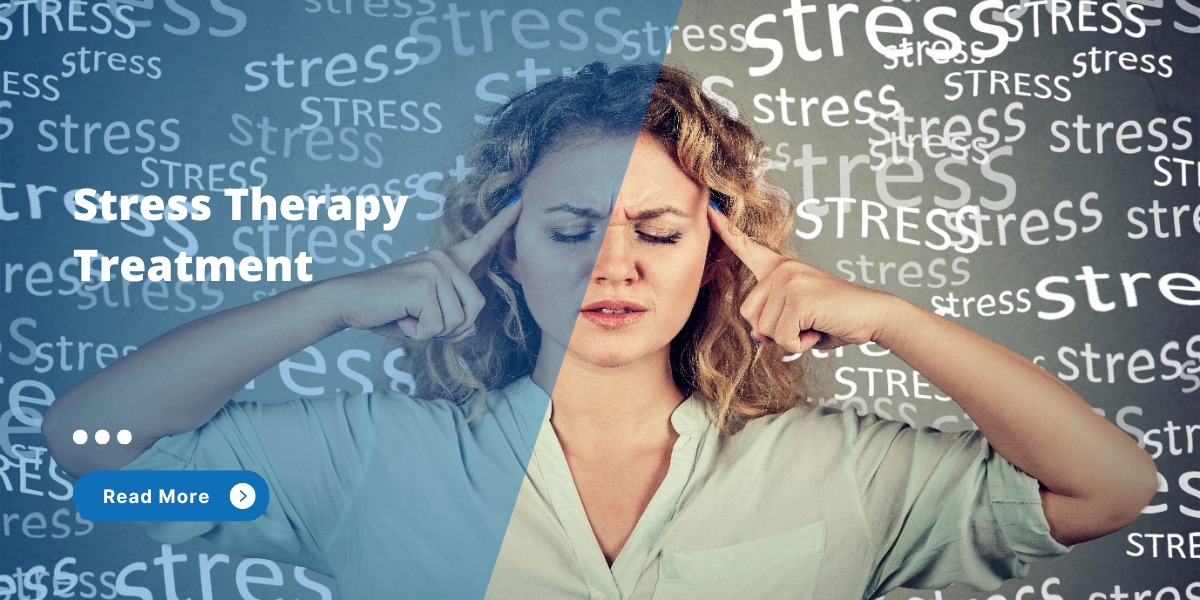How Telehealth is Revolutionizing Autism Care in New Jersey Telehealth medicine is quickly becoming one of the best options Modern...
Continue Reading
Stress Therapy Treatment is essential as stress becomes an inevitable part of life, impacting millions worldwide, including many in New Jersey. According to the American Psychological Association, over 75% of Americans report experiencing moderate to high levels of stress. This stress stems from various sources, including work pressures, financial concerns, and external factors like global conflicts, climate change, and pandemics.
Many people believe that the pandemic has intensified their stress levels. Data says they are right, as there is mounting evidence that society is experiencing the psychological impacts of collective trauma. Data indicates that the prolonged stress from the COVID-19 pandemic has significantly affected health, with chronic illness rates rising, especially in individuals aged 35 to 44. This age group saw an increase in chronic illness rates from 48% in 2019 to 58% in 2023. Mental health diagnoses have also surged in the same group, jumping from 31% to 45% in that period. However, younger adults, aged 18 to 34, reported the highest mental illness rates, with 50% affected in 2023. These statistics highlight the ongoing toll of pandemic and post-pandemic-related stress on well-being.
In its essence, we see stress as informational overload, meaning we receive more information per unit of time than we can process either because there is too much information (sensory overload) or because we spend too much time processing it (cognitive overload). Stress is not only caused by external factors, but is also triggered by internal problems (e.g. hunger), or replaying a traumatic experience in a search for better ways to prevent it from repeating, as in PTSD. Informational overload might also happen when the processing power of the brain is diminished due to sleep deprivation, exhaustion, or the influence of depressants such as alcohol.
When people are overwhelmed by stress, their brains may revert to simpler, more primitive ways of thinking. Finding the best depression treatment for you can help address these mental shifts and provide coping strategies. This process, known as regression, causes individuals to ignore more incoming information and see things in black-and-white terms, leading to impulsive decisions, overreactions, and aggressive behavior. For example, in social situations, someone under stress might view challenges as direct threats, leading to heightened defensiveness or hostility. This shift to a “fight-or-flight” mentality can make maintaining healthy relationships or navigating complex situations difficult. When people experience stress for extended periods, this black-and-white thinking can become a regular pattern, making them feel stuck or emotionally limited.
Fortunately, with the right stress management techniques and therapy, these effects can be reversed. Therapy helps individuals regain a more balanced perspective, allowing them to manage stress more healthily, improve their emotional range, and build resilience against future challenges.

While everyday stress is common, a more severe stress condition, PTSD, affects around 6 % of adults in the U.S. Stress Therapist In NJ can provide support and guidance through effective treatments like trauma-focused cognitive-behavioral therapy (TF-CBT) and Eye Movement Desensitization and Reprocessing (EMDR). Studies have shown that these therapies can reduce PTSD symptoms significantly, with many patients experiencing remission.
Burnout is the state of physical, mental, and emotional exhaustion that occurs due to prolonged stress at work. Time pressure, lack of control over work tasks, long working hours, shift work, and lack of support are important risk factors for occupational stress, burnout, and fatigue.
Burnout can manifest through feelings of energy depletion or emotional exhaustion, increased mental distance from one’s work, and reduced efficacy at work. Occupational burnout can lead to both mental health issues and physical health problems like cardiovascular disease. Addressing burnout through therapy, including CBT and stress management strategies, can restore emotional well-being and improve work-life balance.

At the Advanced Psychology Institute, we provide personalized stress therapy to help individuals regain balance. Our Message-Centered Psychology (MCP), along with cognitive-behavioral therapy (CBT), mindfulness, and other techniques, enables clients to effectively manage stress. These techniques not only help relieve immediate symptoms but also build long-term resilience. Our therapists work with you to identify stress triggers and develop practical strategies to navigate through them.
Our online therapy options ensure that help is accessible, whether you live in urban hubs like Newark or more remote areas. Anger Management Techniques are available through our Anxiety Therapist NJ services, allowing clients to receive expert care without leaving their homes. Online stress therapy provides flexible scheduling, enabling people to fit therapy into their busy routines, which is especially important for those balancing work, family, and personal commitments.
At the Advanced Psychology Institute, we aim to help you manage stress more effectively. Whether you’re dealing with emotional fatigue, chronic anxiety, or personal challenges, our therapists are here to guide you toward better mental health.
How Telehealth is Revolutionizing Autism Care in New Jersey Telehealth medicine is quickly becoming one of the best options Modern...
Continue ReadingUnderstanding and Managing Emotions with Message-Centered Therapy Emotions are the brain’s way of analyzing our social environment, and they have...
Continue Reading5 Benefits of Online Depression Therapy While both in-person and online counseling can be very effective for relationship counseling, depression,...
Continue ReadingRequest an Appointment
(201) 497-0289

Stay Connected
and inspired
Subscribe for our newsletter for expert insights and mental health tips

Copyright © 2024 | All Rights Reserved | Created By Invisio Solutions Ltd